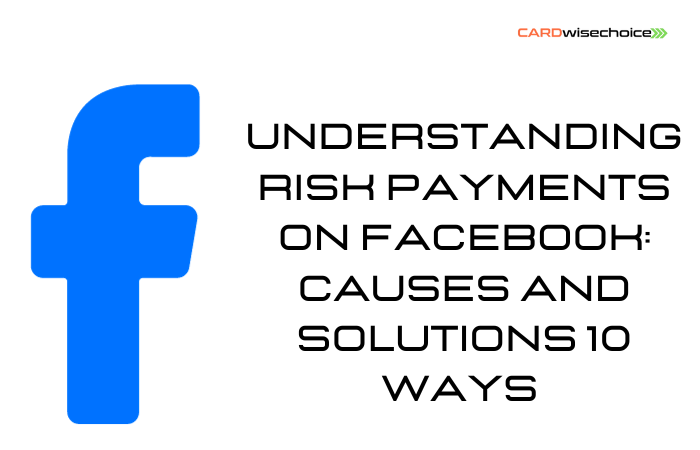
Facebook ads mastercard In recent times, users on Facebook may come across a term known as "Risk Payment." This term can be perplexing for many, as it's not a commonly discussed feature. In this blog post, we will delve into what Risk Payment on Facebook entails, why it happens, and how users can navigate this situation.
What is Risk Payment on Facebook?
Risk Payment is a term used by Facebook to refer to a situation where a user's account encounters an issue related to payment. This could occur for a variety of reasons, such as suspicious activity, potential fraud, or an issue with the user's payment method. When Facebook detects these anomalies, it may temporarily restrict the user's ability to make payments on the platform until the issue is resolved.
1. Suspicious Activity:
- Unusual login patterns or attempts from different locations can trigger a risk assessment by Facebook's security algorithms.
2. Unverified Payment Methods:
- If the payment method associated with the account is unverified or flagged for potential issues, it may result in a Risk Payment situation.
3. Irregular Spending Patterns:
- Sudden large transactions or a significant deviation from a user's typical spending behavior can raise red flags.
4. Payment Disputes:
- Disputes with payment providers or chargebacks may lead to a Risk Payment scenario.
5. Failure to Comply with Facebook's Payment Policies:
- Violations of Facebook's payment policies, such as using fake or unauthorized payment information, can result in a Risk Payment situation.
6. Insufficient Funds: A Common Culprit
The primary trigger for a Risk Payment situation on Facebook often boils down to insufficient funds in your payment method. Facebook's payment system is designed to meticulously deduct the precise amount required for your ad campaign. If the account balance falls short, the system will promptly identify it, potentially resulting in a Risk Payment status for your ad account.
Mitigating the Risk
To circumvent this situation, it's crucial to ensure that your associated payment method has an adequate balance. Whether it's a debit card, credit card, or virtual card specifically for Facebook, maintaining sufficient funds is paramount.
Additionally, if you're utilizing a virtual card provided by cardwisechoice, consider enabling the auto-refill option. This feature acts as a safeguard, automatically replenishing the card's balance to reduce the risk of encountering a Risk Payment scenario.
7. Using a credit card with incomplete information
Another typical cause of Risk Payment on Facebook is utilizing an inaccurate credit card as an FB payment method, such as the CVV or expiration date. To fulfill a payment order, Facebook's payment system requires all of the relevant information. If any of the information are inaccurate or missing, the payment system will identify it and flag the account for Risk Payment, which may result in the payment of an ad account being blocked. The cardwisechoice service offers all of the virtual card information required for successful payments.
8. Card issuing country does not match billing address
If the issuing bank's location does not match the billing address in the advertising account, Risk Payment may be triggered. This is because such a discrepancy may be seen as an indication of fraudulent conduct by advertising networks such as Facebook. cardwisechoice virtual payment cards are not impacted by such flaws because they may be issued in either dollars or euros.
9. Untrustworthy BIN
The BIN (Bank Identification Number) is an important part of the payment process. Untrusted BINs may trigger Risk Payment because cards with such BINs have previously been used for questionable acts. The unique BINs assigned to cardwisechoice cards ensure that the card will be accepted by advertising platforms and that the payment procedure will be as simple as feasible.
10. Problems on the banking side
In rare situations, the bank may fail to authenticate overseas transactions, resulting in Risk Payment. This problem is common in nations with stringent financial rules. cardwisechoice's cards are provided by respected worldwide banks, ensuring a smooth payment transaction.
Resolving Risk Payments:
1. Verify Payment Information:
- Ensure that the payment method associated with your Facebook account is valid, up-to-date, and meets Facebook's payment criteria.
2. Contact Facebook Support:
- If you encounter a Risk Payment situation, reaching out to Facebook support can be instrumental in understanding the specific issue and finding a resolution.
3. Review Your Account Activity:
- Regularly monitor your account for any suspicious or unauthorized activity to help prevent future Risk Payment situations.
4. Adhere to Facebook's Payment Policies:
- Familiarize yourself with Facebook's payment policies and make sure to comply with them to avoid any potential issues.
Risk Payment on Facebook is a mechanism put in place to protect users and the platform from potential fraudulent activities. While encountering a Risk Payment situation can be frustrating, understanding the underlying causes and taking proactive steps to address them can lead to a smoother resolution.
As with any digital platform, it's essential to remain vigilant about your account's security and adhere to the platform's policies. By doing so, you can navigate the world of online payments on Facebook with confidence and peace of mind.
Cardwisechoice provides virtual cards in euros and dollars for online purchasing and advertising (Facebook Ads, Ads on Google, the social networking site Ti Ads, Bing Ads, Twitter Ads, and so on). Meet premium VCCs with a variety of top-up options (including cryptocurrencies) starting at $5 and up to 1 virtual credit card for free.